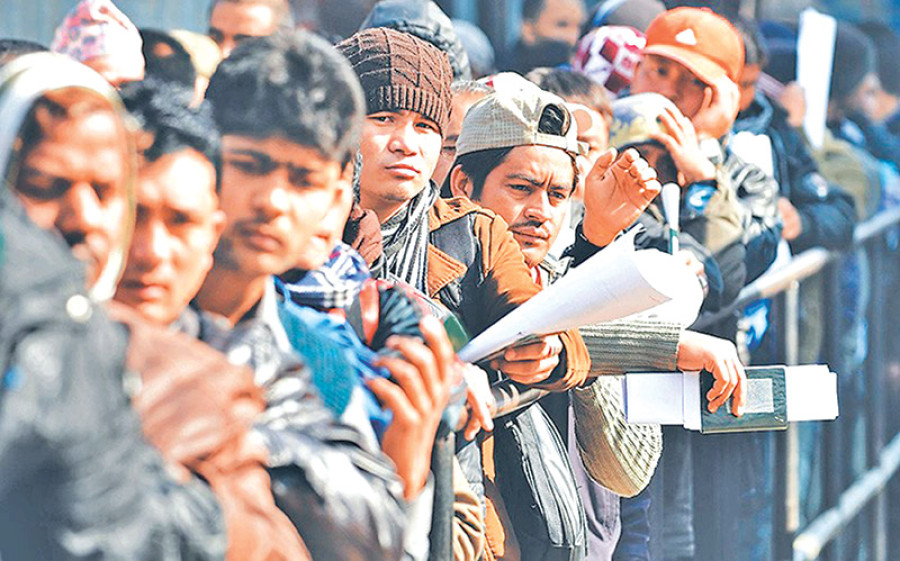Opinion
Forgetting about rights
It has been almost a decade since the country broadly defined and adopted the new constitutional framework for governing the country under a federal democratic republican system.
Himalaya Kharel & Jeevan Baniya
It has been almost a decade since the country broadly defined and adopted the new constitutional framework for governing the country under a federal democratic republican system. However, it is unfortunate that though the superstructure has already been defined, not much has been done to effect the necessary acts and laws in place so as to govern various sectors under the federal governance system. One of the sectors that requires serious clarification is labour migration for foreign employment. The structure, mandates and operational mechanisms of this structure need urgent definition.
All bluster
A significant proportion of the population in Nepal migrates abroad for foreign employment every year and remittances contribute approximately 30 percent of the country’s Gross Domestic Products (GDP). Yet surprisingly, the state has either overlooked or downplayed the issues of foreign labour migration and the concerns, rights, and welfare of migrant workers and their families. The clauses related to labour migration as outlined in the constitution were central to the election manifestos and speeches of political party leaders. Yet now, it is evident that their commitment to address unemployment and the labour migration of millions of Nepalis was only rhetoric.
The country’s new constitution and related laws, namely the Local Governance Operation Act (LGOA) 2017, fail to address the new labour migration related structures, mandates, and operational procedures and responsibilities. This clearly indicates the failure of Nepal’s policy makers, political actors, and civil society. Moreover, it is deplorable that Nepal, despite chairing the recent Colombo Process as well as making international commitments for safe, orderly, and regular migration through Global Compact on Migration (GCM) and Sustainable Development Goals (SDGs), has not considered prioritising these critically important issues that have far-reaching implications.
The current constitution and the LGOA make it explicitly clear that there are several ambiguities in the overall governance of labour management. For example, the LGOA 2017 allotted powers to local level government institutions to manage and regulate foreign employment, but it is unclear whether the provincial governments, ministries or departments will have mandates regarding labour migration governance, as there will be ministries addressing labour management at both the federal and provincial levels. Likewise, there is no mention of the power and jurisdiction of the lower levels of government in the indexes of the constitution; it simply states ‘any subject not incorporated in the list of territorial jurisdictions of the federal, states, and local government or in the concurrent list of territorial jurisdictions of the federal-states and federal-states-local, and any subject not specified in the constitution and other federal laws come under jurisdiction of federal government’. There appears to be an implicit tendency among policy makers to continue to define labour migration governance issues as the responsibility of the federal level.
Concrete mandates
Despite the emphasis on people’s participation in the democratic process of policy making, the way that the legal and institutional frameworks relating to labour migration were formulated demonstrates that those who are directly impacted by these frameworks are rarely consulted, and the representatives they elect rarely champion their issues. Article 51 (I) of the constitution makes the government responsible in ensuring that migration is safe, systematic, and free from exploitation, and that the rights of workers are upheld. The problem is that the current political leadership appears to have little idea about how the new labour migration framework should be designed. They also appear to have little idea about what responsibilities should be devolved or decentralised to which level of government (federal, provincial or local).
There are definitely many challenges in establishing a new labour migration governance system that adheres to the principles of a federal democratic system, but decisions related to the structure and mechanisms should be made administratively, and they should take into consideration the resources that are available. This issue can be addressed by either amending the existing Foreign Employment Act 2007, or by decreeing a new act. Additionally, proper attention should be given to formulating new federal and provincial policies. Some power and mandates as well as services could and should be devolved to the local and provincial level governments, while crucial aspects relating to labour migration for foreign employment could still be governed by a federal level agency.
The political leadership and concerned stakeholders of all the provinces should be involved in this process of formulating a labour migration governance system. They should be given the opportunity to define a framework that is relevant to the future of their respective constituencies. A recent incident occurred where political leaders and elected representatives were not involved in the consultation to prepare the Global Compact on Migration (GCM) for safe, orderly and regular migration. Such issues must not be repeated. Foreign labour migration affairs have predominantly been seen as the business of Kathmandu based recruitment agencies, related government agencies, private stakeholders, migrant workers’ civil society networks, and related civil stakeholders. This mechanism needs to be thoroughly rethought and restructured. It is imperative to facilitate new local actors and interests that are emerging under the new system so as to strengthen labour migration. Representatives must also be responsible and accountable. Organising local migrant workers and protecting their interests by empowering them technically and politically, and providing them with necessary resources will be something worth investing in.
Kharel and Baniya are associated with the Centre for the Study of Labour and Mobility, Social Science Baha




 13.25°C Kathmandu
13.25°C Kathmandu











